Two weeks after the Guyana Revenue Authority (GRA) issued a demand letter to SOL Guyana Inc (Sol) for more than $3.3 billion in Excise Taxes and interest, the two entities are engaged in a discussion on the way forward.
The monies, according to GRA derive from Sol’s alleged misuse of the Permits for Immediate Delivery (PID) system by commingling tax-exempted fuel with fuel not exempted or partially exempted so as to avoid paying taxes owed on the required basis. Specifically they relate to the alleged misuse of Tax Exemption letters issued to Esso Exploration and Production Guyana Limited (EEPGL), the ExxonMobil subsidiary operating in Guyana.
“SOL Guyana Inc. utilized EEPGL’s tax exemption letters to import and enter quantities of Gasoil…at a lower rate of Excise Tax, and failed to deliver the full amounts to [EEPGL] as required…This act in itself is a flagrant disregard of the laws administered and the Revenue Authority will not condone and allow the government revenues to be used as ‘turn overs’ or in any such manner,” the letter dated March 9 maintains.
In the same letter which was seen by Stabroek News, GRA committed to practice the rules of natural justice and work closely with Sol to resolve the issue.
Reference is made to a February 22 letter written by Sol Group Tax Manager, Natasha Rocha Maggessi in which she requested an opportunity to be heard and claimed that there were several discrepancies in the information provided by GRA and the records maintained by Sol.
Stabroek News reached out to General Manager Earl Carribon for an update on the ongoing process but was referred to the company statement issued two weeks ago.
“I’m not in a position to give an updated comment at this time so no comment,” he said.
The last statement from Sol on the matter was issued on March 7. At the time the company denied the GRA accusations.
“(Sol) is aware of recent statements alleging that fuel importers, including Sol, have abused duty exemptions in Guyana. Sol categorically denies these false, highly misleading, and damaging allegations,” the company’s statement said.
It underscored that the company holds strong to its “core values of Integrity, Respect, Safety and Community” and they are the pillars of its operations.
Sol said that it has worked with the GRA collaboratively and has systems in place to ensure its compliance at all times.
“We have worked collaboratively with the Guyana Revenue Authority and want to assure our customers, partners, and the people of Guyana that we have robust procedures in place to ensure that we remain in compliance with our duty obligations as well as our other legal and corporate social responsibilities,” the company stated.
“As part of its assurance process, Sol has commissioned an independent third party to conduct a verification and reconciliation of its duty position, which confirms Sol is current and compliant with duty exempt importation regulations,” the company said.
“Sol is proud to be a safe and reliable supplier of fuels and energy solutions to the people of Guyana, and will vigorously defend the strong reputation it has built over many years against libelous and damaging statements,” it added.
Two days later documentation was sent to the company which contended that Sol in 2015 imported 6,320,410 litres of fuel for EEPGL but none of this fuel was uplifted by the oil company within the legally prescribed time period. In 2016, a total of 12,618,910 litres was imported for Exxon but only 3,591,380 was uplifted in the required time period while in 2020 a total of 202,829,427 litres was imported and only 147,982,679 litres uplifted.
In total Sol is alleged to have retained 70,194,697 litres of fuel over the three years referenced. The letter explains that $2.8 billion in Excise taxes is owed on that amount while $551 million in interest is owed on the debt.
The letter signed by Deputy Commissioner in charge of the Law Enforcement and Investiga-tion Division (LEID), Jason Moore acknowledges that quantities of fuel in excess of that which was approved may have been imported at duty paid price and delivered to EEPGL at duty free price but maintains that this was an action taken to Sol’s own detriment.
“To engage in such [an] act and dictate the Revenue Authority to adjust its record to possibly offset against additional quantities sold/delivered at duty free price (more than the actual amount respectively approved as duty free by the Authority), would be tantamount to your company having the authority to, among others, grant approvals and extend the validity period of the tax exemption letters,” Moore writes.
However an olive branch is offered in light of the precedent set in a similar case relating to the BOSAI mining company.
Moore indicated that the Authority may upon further review allow Sol in this case only to recoup on the quantity of 57,555,666 litres which may have been imported and entered at duty paid price and delivered to the beneficiary at the duty-free price, provided this is proven.





